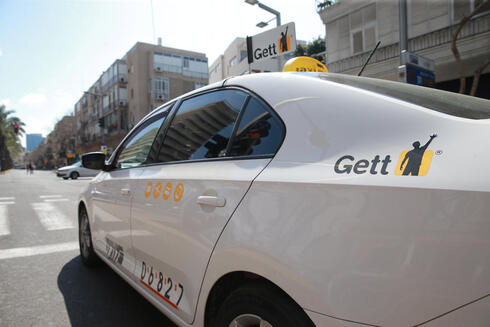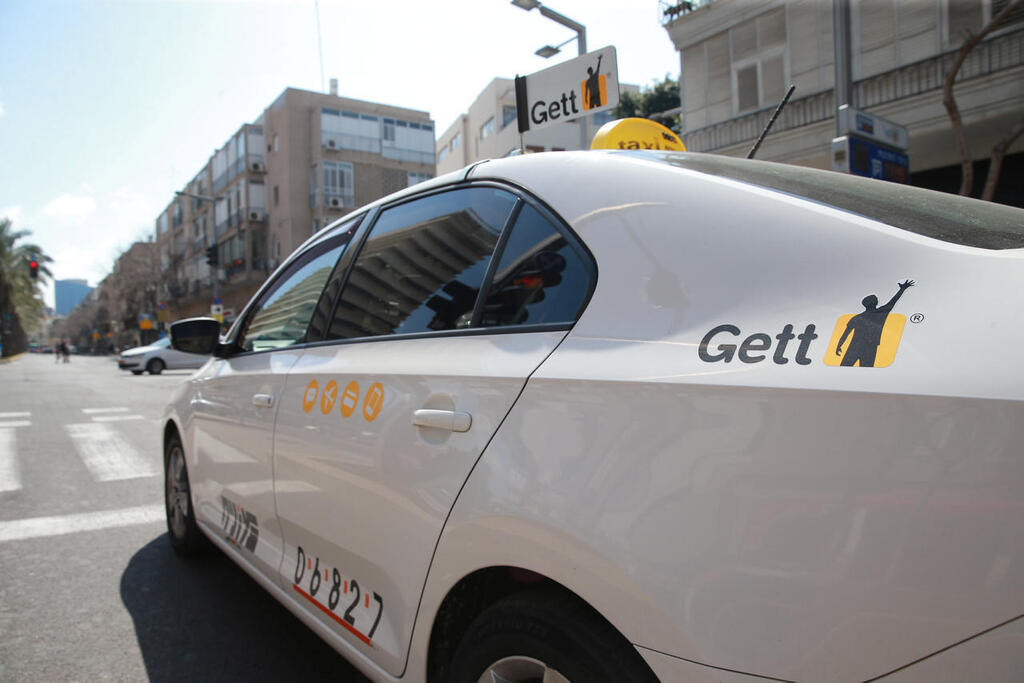
Analysis
Bumpy ride: How Gett went from a promising unicorn to just another shuttle company
Founded 14 years ago, transportation company Gett reached unicorn status in 2016, but these days is conducting negotiations for its sale at a value of only $200 million - a fifth of what it raised. The company that promised to be a transportation game changer finds itself stuck in traffic behind its competitors who are already trading at huge valuations
2016 was a particularly good year for Gett. The ride-sharing company had just changed its name from GetTaxi to "Gett" to signal an expansion into the field of deliveries. The German automobile giant Volkswagen poured an investment of $300 million into the Israeli company, making it a unicorn. The large amount of capital that flowed in led it to the doubling of its research and development team in Israel and it explored a series of acquisitions.
Gett was being compared to Uber, the American giant that had already been valued at over $18 billion. "We connect millions of people in taxis in three minutes or less," Dave Waiser, then CEO and founder of Gett, told the Financial Times at the time, "It's not a miracle, it's a commodity."
Waiser has since left the company he founded in 2009, but the long period he managed it was more than enough for him to see with his own eyes all the universal stages of a taxi start-up: from the promise to change the way people behave in the space, to expansion to major cities in the world, collaborations with giants vehicle manufacturers, branching into shipments, the efforts to go public and finally - the inevitable withdrawal.
Negotiations are taking place these days for the sale of the company at a value of $200 million, a fifth of what it raised since being established. Gett's story is part of a unique puzzle created by startups in the field of urban transportation. One that was led by buzzwords and grand promises of disrupting an out-of-date industry and padded out by investors, entrepreneurs and newspapers with unrealistically large numbers.
Second only to Uber?
Gett and similar companies such as Uber, Lyft and DiDi challenged the traditional taxi industry while very successfully establishing themselves in the second decade of the 21st century as growth companies in the technology sector, this despite the fact that a big question always hovered over them: Are these actually technology companies considering technological innovation is not the key to their success, even though they do provide a service through an application? The answer given to this basic question largely dictated the life cycle of each of them.
Gett's model was simple and completely similar to all its competitors: the company's system finds the taxi closest to the user's location and with algorithmic efficiency reduces the waiting time to less than 10 minutes. The system gives users access to information about the driver, the vehicle and real-time data of the trip they ordered. The company differentiated itself from the many competitors in two ways - it worked only with licensed taxis and placed emphasis on developing and selling products to businesses.
In a short time Gett (then GetTaxi) became an international company. In 2014, its activities were spread across four countries and focused on the cities of Moscow, St. Petersburg, Tel Aviv, London and New York, which was also its fastest growing market. In June of that year, Waiser announced that the company expected to conclude 2014 with revenues of approximately $100 million dollars and on Facebook announced the company he founded as a global competitor, second only to Uber. "GetTaxi is expected to reach half a billion dollars in revenue next year," he wrote, he was wrong, as was his estimation that the company would become profitable within a year. "Today, GetTaxi is the largest player in the world in terms of revenue, it is several times larger than all of its direct competitors: Lyft, Hailo, and MyTaxi," he added.
Two months later, in August 2014, Gett completed its largest funding round at that time - $150 million led by the Swedish fund VNV Global. The value was not revealed, but in light of Waiser's statements about the dizzying growth rate and its expected revenues, the consensus was established that its value is between $2-3 billion. Waiser helped substantiate this assessment in a conversation with the media two months later. "One of our competitors - Lyft - raised a billion dollars a year ago and since then they have continued to grow," he said, "we are bigger than them, so you can guess where we are."
In VNV's 2015 reports, the investment fund stated that in 2014 it valued the 6.7% of Gett shares it held at $25.6 million, amounting to a total value of $382 million for Gett as of December 31, 2014. In the same year, Lyft raised at a value of $700 million. "Today, GetTaxi is number two in the world after Uber," Waiser said in 2014. A year earlier, Forbes magazine named it one of the fastest growing companies of the year.
Even so, Gett felt bigger than it apparently was and the press echoed these feelings when in fact two more years would be required before Gett actually gained the value of a unicorn. This only happened in 2016 when Volkswagen poured $300 million into the company at a value of $1.2 billion.
What was by no means small was the large amount of capital raised by the company and intended to turn ideas into reality and help it grow and expand organically. The apparent goal was clear - to provide a traditional product of a taxi ride or deliveries around the world, but Gett made sure to emphasize transformative uses for the human condition. "People die every day because they didn't get an insulin or allergy shot in time," Waiser told the Financial Times in 2015. "What if a network of cars and drivers were available at the click of a button to bring them life-saving shots?" With the capital from Volkswagen, Gett bought the small competitor Juno for $200 million in order to gain a big foothold in New York, but it didn't help.
Volkswagen's flop
In August, VNV reported about a 10% drop in the value of Gett and that the company manages orders of about a billion dollars, and that half of the company's revenue comes from New York and London and the other half from Israel and Russia. The press reported that the drop in value was to around $1.4 billion and noted that Gett generates revenues of one billion dollars. In December 2018, "Der Spiegel" reported that Volkswagen was not satisfied with the growth of Gett, which apparently failed to increase its global market share, and decided to write off its investment completely. "Der Spiegel'' declared the whole move a "flop".
A year later, in November 2019, Gett announced the closure of Juno's operations or, in fact, the operations in New York, and instead entered into a partnership with its competitor Lyft. Waiser himself explained in a conversation with TechCrunch that now the goal of the company is to hold on to "third place". In January 2020, Gett announced that the company concluded December 2019 (after the closure of Juno) with operational profitability, which was a spectacular achievement by all accounts in the travel app market that is known mainly for its cash burn. The news was echoed again and again, pointing to Gett as an exceptional company. But the joy did not match the reality. Not only does "operating profitability" still mean a loss, but Gett removed from the accounting term additional costs that are usually included in operating profit, including product costs and research and development expenses.
In 2020, Get raised $120 million (most of it in debt) according to a value of $1.5 billion and it was finally proven that Gett was not seen as competition in the travel application market. Just a year earlier, Uber listed for trading at a valuation of $82 billion and posted $13 billion in revenue, while Lyft issued at a valuation of $24 billion and collected nearly $3 billion in revenue. The enormous distance created between Gett and Uber and Lyft was so great that when VNV crowned 2020 as "the best in its history", it also stopped describing Gett as a competitor, and it changed from a "global ride-sharing application" to a SaaS (software as a service) company whose goal was "to help businesses around the world move from point A to B."
How the IPO slipped away
Riding on the coatails of the growth of the technology sector and the bubble of SPAC mergers, Gett signed a preliminary agreement in November 2021 for a merger with the SPAC company Rosecliff Acquisition Corp. The merger was supposed to take Gett to a destination that all the major travel apps had already reached before - Nasdaq. Its expected value was supposed to be reduced to $1.1 billion.
The deal also revealed some of Gett's business results, with the most interesting of all being the revenues that were far from Waiser's statements from 2014. Gett concluded 2019 with revenues of $167.6 million or a 67% increase in revenues over the past five years, significantly lower than the 400% annual growth that Waiser predicted. Gett concluded 2020 with revenues of $162 million and estimated that 2021 would generate revenues of $190 million and 2022 would finish with revenues of $337 million, not even the half a billion dollars in revenues that it expected to register in 2015.
Shrinking or not, the deal included what Gett needed most of all, an infusion of cash of almost $300 million intended to help the company expand to other markets in the world, including the United States. The celebration was too early. "Fortunately, the company has withdrawn its attempt to list through the SPAC market in the United States," VNV wrote in its April 2022 quarterly report, adding that Gett is weighing down its assets. In March, when the parties announced that they were finalizing the merger agreement between them, Gett announced that it was permanently withdrawing from all activities in Russia, and was disbanding the Russian legal entity it had established. Then they announced to the press that it was an activity with a "marginal" share of the company's activity, "only" 14%. Thus, within half a year, the company that was supposed to receive a bundle of cash to expand announced that not only will it not expand, but it will reduce its international presence. In early September, Rosecliff announced a new merger agreement, this time with a startup that operates in the field of medicine.
Into the empty space left by the SPAC came the VNV fund, which saw an opportunity to seize control of the company. Over the years, VNV has held about 5% of Gett's shares and when it led its first huge round it claimed that it had "a good potential to be one of the three long-term players in London and New York".
During the second quarter of 2022, it purchased Gett's debt for $41.8 million and its holdings jumped to 48.8%. "The focus on achieving profitability by focusing on its mature assets and less on future growth opportunities means that the company has left the start-up phase," VNV wrote and announced Waiser's departure. Upon his retirement, two senior executives from the company were appointed to replace him - Max Krasnykh, who previously served as COO, and Matteo de Renzi, who managed the company's operations in the UK
A quarter later they already announced the completion of the reorganization, that the company is debt-free and presented a new price tag for Gett: $247 million. The description of the company had also been altered. "Gett is: the leading transportation company in Israel with an additional presence in London," they wrote.
















